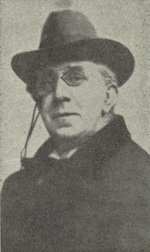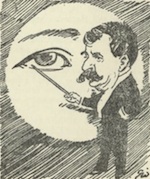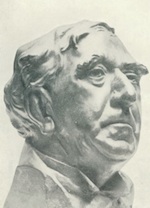HELEN CORR recalls the life of Scottish ILP activist and social reformer Martin Haddow who worked tirelessly to improve the health and education of Glasgow’s working class children.
Born on 29 March 1865, William Martin Haddow was the second son of Robert Haddow, a grain merchant and his wife Janet (née Martin). At the time of Haddow’s birth his parents had a partnership in a grocery store in the East End of Glasgow. Mrs Haddow was the very successful manageress of the business, and it was largely through her enterprising efforts and hard work that the family lived in comfortable circumstances, and were highly respected members within their community.
Robert Haddow was a staunch leader of the established Church of Scotland and a superintendent of the Sabbath School. During his childhood, Martin Haddow attended two church services every Sunday. He received an elementary education until the age of 14 and then in accordance with his parents’ wishes went into the teaching profession.
Haddow took a post as a pupil teacher at a South Side school in Glasgow but found the daily routine long and uncongenial. He resigned from his teaching post before the four-year apprenticeship had been completed, and failed to acquire a teaching certificate.
Haddow entered the Post office in 1882 and worked for the National Telephone Company for two years. One major benefit of this employment was that he attended classes at Glasgow Technical College and acquired a practical and technological knowledge of electronics and engineering.
This experience proved to be useful because his next job, in 1884, was as an electrician in Dumbarton’s shipyard to install electric lights on ships. The prospects were comparatively good – he was paid 20 shillings for working 54 hours a week and, more importantly, had the opportunity to travel to Germany and the Suez Canal with the firm.
When he returned to Glasgow in 1887 he was employed as a foreman on one of the most advanced generating power stations in Scotland. This experience encouraged him to set up his own electrical firm, launched under the name of Haddow & Co in the early 1890s. It was successful with well-paid and decently treated workers.
Political interest
Already in the late 1880s, Haddow had begun to take a serious interest in trade unionism and politics. His enthusiasm was fired by listening to speeches by prominent Labour and socialist leaders, including Keir Hardie, Bruce Glasier, Tom Mann and HM Hyndman, and as an avid reader of the Labour Leader.
In 1889, Haddow came into personal contact with Keir Hardie and the men consolidated a close and lifelong friendship. Hardie made a profound impact in shaping Haddow’s political beliefs. In his memoirs, Haddow wrote:
“… there is no doubt that Keir Hardie influenced my whole life and I vowed that I would devote as much time as I could to the service of the Labour movement.”
Haddow became a founder member of the Scottish Labour Party in August 1888 and of the Independent Labour Party in 1893. During this period he also became a leading figure in local politics. In 1900, he was appointed chairman of the Labour Representation Committee in Glasgow; and in the same year he stood as an ILP candidate for the Gorbals in the November municipal elections, but came bottom of the poll. One of his most successful ventures was setting up a trade union for electricians in Glasgow. The first meeting took place at Nelson’s Temperance Hotel in 1890 and Haddow was elected secretary.
At this time Haddow formed part of a lively discussion group of ILPers and socialists who met regularly in Glasgow tearooms to discuss politics; and it was as a result of this political activity that the Glasgow Socialist Sunday School Movement was founded in 1896. Haddow became closely associated with the movement and was a regular supporter of their monthly magazine, the Young Socialist.
His advocacy of the principles of the Socialist Sunday School Movement was part of his rejection of the strict churchgoing of his younger days and he now favoured a non-denominational stance. He was an ardent opponent of any form of religious bigotry displayed by the clergy and he frequently attacked them for their hypocrisy.
In Haddow’s view, “the churches make a practice of worshipping God on Sundays but for the other six days he is put in cold storage and the world is given over to the mammon.”
Education and child welfare
Haddow’s contact with Socialist Sunday School leaders like Lizzie Glasier sparked off a deep interest in educational reform. From the early 1900s Haddow decided to involve himself in official educational circles in the belief that he could provide an effective voice of opposition to the ideas of the clergy on educational and religious issues. As part of this campaign he stood as a candidate for the Glasgow School Board in 1903 and was elected with a majority of 12,433.
During the same year he was sent as a delegate to an educational conference in Bradford and heard a paper on the eyesight of school children by a medical officer from the London School Board. The paper left a deep impression on him and, on returning to Glasgow, Haddow began preliminary tests on the eyesight of children in a selected number of schools. Following these experiments, Haddow recorded that the Glasgow Eye Infirmary was besieged with child patients with poor eyesight and he became convinced that School Board authorities should assume overall responsibility for the welfare of children during school hours.
On 5 April 1904 Haddow became convenor of a School Board sub-committee to consider the advisability of feeding necessitous children in Glasgow schools. In this task he met considerable opposition from clerical and lay members who believed that private charity could cope with these problems. Nevertheless, his efforts were greatly aided by the publication of the Inter-Departmental Report on Physical Deterioration in 1904. Among its recommendations was the establishment of a system of regular medical inspection of children in elementary schools.
The 1908 Education (Scotland) Act gave school boards powers to feed necessitous children and to provide medical inspections in schools; and while the issue had become a national one it was also a personal victory for Haddow since he had been a leading figure in the campaign at local level.
Throughout the campaign, Haddow used newspapers, pamphlets and articles to publicise general deficiencies in medical care in Glasgow. When the socialist journal Forward was launched in 1906, Haddow was one of its original directors. In the same year he was elected as School Board representative to the Court of Directors of the Glasgow Eye Infirmary. He was also closely connected with the establishment of the Reformer Bookstall Ltd, a firm which published ILP and socialist literature; Haddow wrote some of their early pamphlets on the feeding of school children in Glasgow.
He was also involved in a range of other educational schemes affecting the welfare of children in Glasgow. In 1905 he pioneered the opening of a school for boys who had been truants from previous educational establishments. One of the most significant features of this experiment was that the school was inter-denominational and this, for him, represented “… another nail in religious bigotry”.
It was with considerable personal satisfaction, therefore, that Haddow became one of the first convenors of a committee for mentally defective and truant children in Glasgow during 1905. It was also during this period that he was appointed Governor of Educational Endowments in Glasgow and of a school for poor orphans, more commonly referred to as the Buchanan Institute in Glasgow.
Haddow resigned from the Glasgow School Board in 1915, in favour of another appointment with the board as deputy master of works. When School Boards were replaced by local educational authorities in 1918, he became a member of the Educational Committee of Glasgow Corporation. He officially retired from this job in 1930, but his interest in educational attainment never waned.
Indeed, his work as an educationalist and social reformer continued in 1931 when he became member and later chairman of Barlinnie Prison’s Visiting Committee. It was also during the early 1930s that Haddow became a member of a special committee for unemployed men and juveniles, and Polmont reformatory school for boys.
Artistic circles
Apart from his educational activities, Haddow had a long-standing association with artistic circles in Glasgow. He was a lover of classical music and became one of the early governors of the Royal Scottish Academy of Music. It was consistent with Haddow’s belief in a socialist society that he wished to bring musical festivities within the reach of working class people. In his autobiography he referred to it as his campaign for brighter socialist propaganda.
Around 1910 Haddow approached the executive committee of the ILP to discuss how political activity could be united with the artistic side of the movement. The practical outcome was a series of Sunday evening lectures on art, music and literature under the auspices of the ILP. Haddow recorded his deep sense of pride when speakers like GK Chesterton and George Bernard Shaw lectured to massive ILP audiences in Glasgow.
 With equal success he induced the directors of the Moody-Manners Opera Company to present a lecture on music in 1912. Along with other art enthusiasts, Haddow founded the Glasgow Music Festival in 1911, the Socialist Music Festival in 1917, and the Socialist Art Circle in 1921. In later years, Haddow’s distinctive contribution in this area was formally recognised when he became president of these societies.
With equal success he induced the directors of the Moody-Manners Opera Company to present a lecture on music in 1912. Along with other art enthusiasts, Haddow founded the Glasgow Music Festival in 1911, the Socialist Music Festival in 1917, and the Socialist Art Circle in 1921. In later years, Haddow’s distinctive contribution in this area was formally recognised when he became president of these societies.
He also became a member of the Henry Muirhead Trust (by an uncle of RE Muirhead) which was founded in 1890 for the university education of women. Haddow used his influence to persuade the trustees to divert some of its income to support the musical education of female students at the Royal Academy of Music.
Another interest was foreign travel, and his trade union connections gave him the opportunity to attend international trade union and socialist conferences in Amsterdam, Copenhagen and Germany before 1914.
When the First World War broke out in August 1914, Haddow was part of the anti-war movement in Glasgow. He had opposed the Boer War and remained a pacifist. But he did not become a prominent figure in the anti-war cause after 1914, partly no doubt because he was not a good public speaker and he lacked the public personality to lead a national campaign.
In general, Haddow preferred sitting on committees, ensuring that there were enough financial donations to support and to sustain a radical or socialist cause. He was a practical and pragmatic thinker who preferred direct action and involvement at a community level. His political contribution within the ILP lay in his unflinching desire to improve the daily lives of working class people through the provision of welfare, artistic and educational facilities. At the same time, he served the ideal of a socialist society with patience and steadfast loyalty.
In politics, WM Haddow shared many views that were closely associated with those of the Fabian socialists. He believed in the gradual transformation of capitalism through a series of social reforms and political education. Within ILP and socialist circles in Glasgow, Haddow commanded deep respect for his talents as a writer and social reformer. From the beginning he was a central figure in the ILP, especially its Scottish activity, although at one point of his career he was made national chairman of the executive committee of the ILP.
After a prolonged illness, William Martin Haddow died of chronic bronchitis in a Glasgow nursing home on 19 January 1945, aged 80. He was married and had two children. His only son, Arthur, had died the previous evening in India following an unsuccessful operation, but he was survived by his daughter. She married Ian Macpherson, a professional singer.
—-
This article was originally published in Scottish Labour Leaders 1918-1939: A Biographical Dictionary, edited by William Knox, 1984, and is re-printed with permission of the editor to whom we owe many thanks.
William Martin Haddow’s autobiography, My Seventy Years, was published in 1943.


